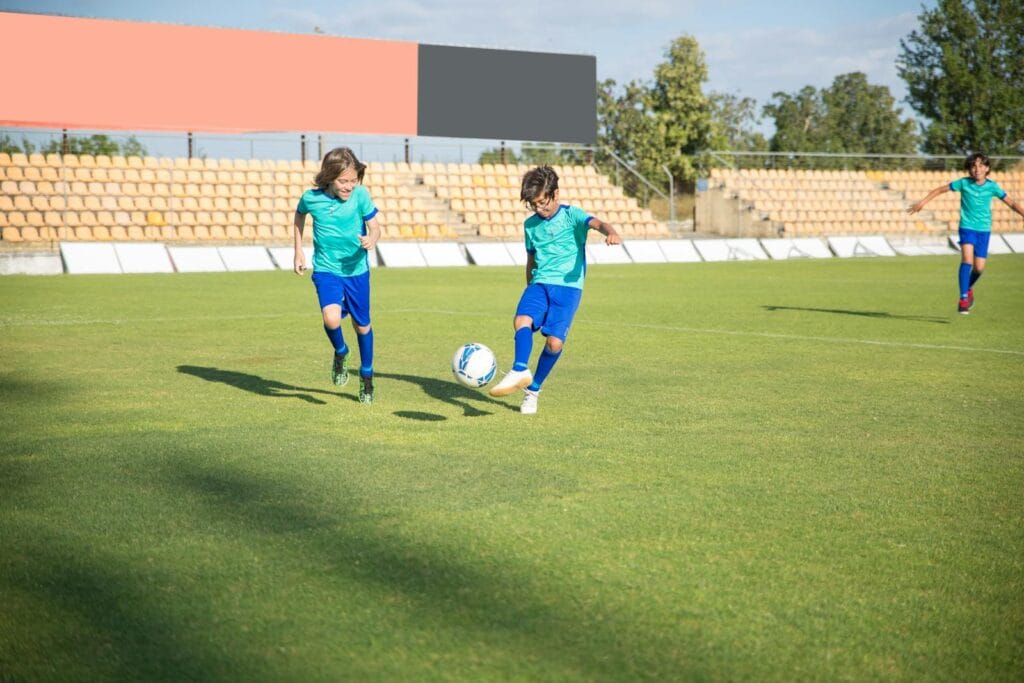This post contains affiliate links. If you make a purchase from one of the links, I may earn a commission at no extra cost to you.

How to Nurture Your Child’s Sporty Side: Essential Strategies for Building Athletic Confidence and Skills
Some kids are all about sports, while others might need a little nudge to get moving. If your child is showing even a spark of interest, you’ve got a real opportunity to help them grow—physically and mentally. The trick to nurturing your child’s sporty side is making sure the environment is supportive and fun, with the focus on effort and personal growth, not just the scoreboard.
A lot of parents worry about keeping their athletic kids motivated without piling on the pressure. You can encourage your child to stay committed to their sport and help them build confidence along the way. Sports are great for teaching life skills like teamwork, discipline, and how to handle both the good days and the tough ones.
Taking the right approach gives your child a healthy relationship with sports, something that could stick with them for years. By understanding some basics of youth sports, using a few smart support strategies, and focusing on character, you’ll help your young athlete thrive—on the field and off.
Key Foundations For Developing Your Child’s Sporty Side
Getting the basics down—movement skills, playful exploration, and trying out different sports—sets the stage for athletic growth. These elements work together to help your child feel confident and capable when they’re active.
Supporting Fundamental Movement Skills
Fundamental movement skills are the base for all sports. We’re talking about things like running, jumping, throwing, catching, and kicking.
Kids really need to get comfortable with these before moving on to anything more complex. If they skip these basics, advanced moves will just be harder.
Some movement patterns to focus on:
- Running – Forward, backward, sideways
- Jumping – Two feet, one foot, landing safely
- Throwing – Overhand, underhand, near and far
- Catching – Different ball sizes and speeds
- Kicking – Stationary and moving balls
Try practicing these skills through simple games. Toss a ball around in the yard, or see who can jump the farthest at the park.
Keep it playful, not rigid. Kids pick things up faster when they’re having a good time.
Set age-appropriate expectations. Younger kids need more time to get the hang of coordination and balance.
The Role of Deliberate Play in Skill Development
Deliberate play is just a fancy way of saying your child is learning sports skills through fun, self-chosen activities. It’s not about drills or strict routines.
When kids play this way, they try out different moves, solve problems, and make quick decisions on the fly.
A few examples:
- Pickup basketball with friends
- Kicking a soccer ball against the garage
- Swimming races at the pool
- Backyard football scrimmages
This kind of play sparks creativity and helps kids react to surprises—the kind that always pop up in real games.
Why deliberate play matters:
- Improves decision-making
- Builds sport skills naturally
- Keeps motivation high
- Takes the pressure off
Give your child plenty of time to just play. Sometimes, they learn more from goofing around than from structured lessons.
Team sports are great for this, too. Pickup games teach cooperation and communication without anyone even noticing.
Early Exposure to a Variety of Sports
Letting your child try different sports helps them figure out what they like and where they shine. Specializing too early can actually slow them down and even lead to more injuries.
Mix it up with activities like:
- Individual sports: Swimming, gymnastics, tennis
- Team sports: Soccer, basketball, baseball
- Skill-based activities: Martial arts, dance, track and field
Every sport brings something new. Soccer is great for footwork, basketball for hand-eye coordination.
Sampling different sports:
- Lowers risk of overuse injuries
- Builds a wider range of skills
- Helps spot hidden talents
- Keeps things interesting
Watch for what your child genuinely enjoys. There’s no need to push them into something just because it’s popular.
Supporting your child’s sporting development is about matching activities to their stage and motivation.
Team sports help with social skills. Individual sports are good for building independence and personal responsibility.
Effective Ways To Encourage And Support Sporty Interests
Helping your child love sports is about positive feedback, keeping things fun, and showing them what an active life looks like. These ideas work together to build motivation that sticks.
Encouraging Your Child Through Positive Reinforcement
Positive reinforcement is huge for building confidence and keeping kids interested. Focus on their effort, not just wins or losses.
Praise specific things like great teamwork, learning a new skill, or just showing up and trying hard. Instead of a generic “good job,” try “I saw how you helped your teammate today.”
Celebrate the small stuff. Maybe they finally nailed a tricky move or showed good sportsmanship. Sometimes just having fun at practice is a win.
A simple reward system can help, too:
- Weekly shout-outs for showing up
- Small rewards for hitting skill milestones
- Team spirit awards for positive attitude
- Certificates for personal progress
Don’t compare your child to others. Every kid has their own pace and strengths.
Celebrate their efforts and achievements no matter how the game goes. This builds motivation that lasts.
Balancing Enjoyment and Motivation
Sports should be fun and also teach life lessons. Striking that balance keeps kids from burning out and helps them stick with it.
Keep expectations in check based on your child’s age and abilities. Young athletes need time to develop, both physically and mentally.
Make sports enjoyable by joining in at home. Kick a ball, play catch, or just practice together.
Listen to your child. If they’re frustrated or losing interest, talk about what’s going on and try to find a fix.
Mix up practice with games to keep things fresh.
Don’t overload the schedule. Kids need downtime, other hobbies, and plenty of free play.
Support their commitment to their sport, but let them switch things up if they want.
Role Modeling an Active Lifestyle
Kids watch what you do way more than what you say. Your habits around physical activity set the tone.
Show enthusiasm for being active in your own life. Go for walks, ride bikes, or join a rec league.
Show up for their games and practices when you can. It means a lot.
Share your own sports stories—the good, the bad, and what you learned along the way.
Do things together as a family. Hikes, swimming, or a little backyard soccer all count.
Keep a positive outlook about competition and setbacks. Show them how to handle wins and losses with a good attitude.
Make sure they have the right gear. It shows you care about their involvement.
Talk about why staying active matters, not just now but for life.
Building Character And Emotional Skills Through Sports
Sports are about more than just physical skills. Kids pick up life lessons—how to compete fairly, respect others, and keep going when things get tough.
Fostering Healthy Competitiveness
A bit of competition pushes kids to improve and reach for new goals. In sports, they learn to challenge themselves while still respecting others.
Learning to handle both wins and losses is important. Losing isn’t the end of the world—it just means there’s room to grow.
What healthy competition brings:
- Boosts self-confidence
- Teaches goal-setting
- Builds resilience
- Encourages growth
Help your child focus on getting better, not just beating others. Ask about their favorite moments or what they learned. This builds motivation that sticks.
Building character through sports helps kids become responsible, determined adults who work well with others.
Teaching Sportsmanship and Fair Play
Sportsmanship is all about playing fair and treating everyone with respect. Kids pick up these values by watching how adults and teammates act during games.
Fair play isn’t just about following rules—it’s about doing the right thing, even when nobody’s looking. Kids who learn this become better friends and teammates.
Good sportsmanship looks like:
- Shaking hands after the game
- Helping up an opponent
- Accepting calls without arguing
- Cheering on teammates
If your child slips up, talk about it right away. Explain why it matters and how to handle things better next time. Teaching sportsmanship through sports activities helps kids build important social skills.
Promoting Hard Work and Perseverance
Sports show kids that real progress comes from consistent effort and practice. Your child figures out pretty quickly that talent’s only part of the story—they’ve got to put in the work to actually get better and reach their goals.
When kids run into tough spots in sports, they start building mental toughness that sticks with them in school and just life in general. They learn to shake off mistakes and keep going, even when things feel tough or frustrating.
Ways sports build work ethic:
- Daily practice helps create routines and discipline
- Improving skills takes patience and lots of repetition
- Team goals depend on everyone’s commitment
- Setbacks push kids to solve problems
Try to celebrate your child’s effort, not just the scoreboard. Maybe you notice them practicing after dinner or encouraging a teammate who’s struggling. Youth sports build character and life skills that go way beyond the field.



